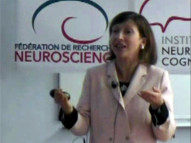Neuroscience seminar series:
Maria Geffen – Assistant Professor of Otorhinolaryngology
University of Pennsylvania, Perelman School of Medicine
‘Neuronal circuits for dynamic auditory processing and learning’
Title : Fetal stress and epigenetic regulations in the normal and diseased developing brain
![]() Video of the event (restricted to Paris descartes members).
Video of the event (restricted to Paris descartes members).
Hearing perception relies on our ability to tell apart the spectral content of different sounds, and to learn to use this difference to distinguish behaviorally relevant (such as dangerous and safe) sounds. Recently, we demonstrated that the auditory cortex regulates frequency discrimination acuity following emotional learning. However, the neuronal circuits that underlie this modulation remain unknown. In the auditory cortex, excitatory neurons serve the dominant function in transmitting informationabout the sensory world within and across brain areas, whereas inhibitory interneurons carry a range of modulatory functions, shaping the way information is represented and processed. I will discuss the results of two of our recent studies that elucidate the function of specific inhibitory neuronal population in sound encoding and perception. In the first study, we find that interneurons in the auditory cortex, belonging to a specific class (parvalbumin-positive), modulate frequency selectivity of excitatory neurons, and regulate frequency discrimination acuity and specificity of discriminative auditory emotional learning. In a second study, we find that two different classes of cortical interneurons differentially amplify the ability of excitatory neurons to adapt their responses to frequent sounds. By selectively reducing responses to frequently, but not rarely, occurring sounds, auditory cortex enhances the brain’s ability to detect unexpected events. These results expand our understanding of how specific cortical circuits contribute to auditory perception in everyday acoustic environments.

